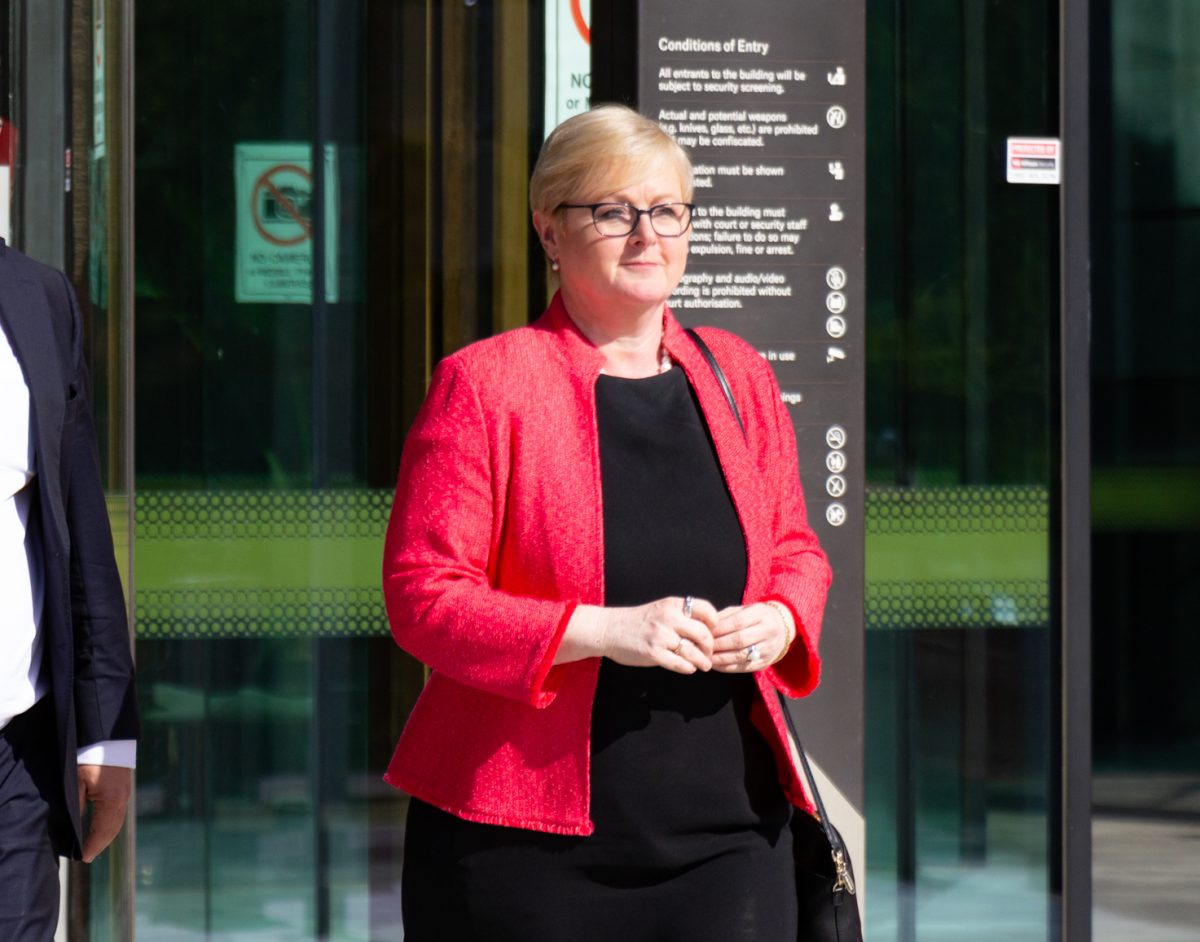
Senator Linda Reynolds leaves court after her testimony in the case against Mr Lehrmann. Photo: Albert McKnight.
The Director of Public Prosecutions’ (DPP) full concerns about how Senator Linda Reynolds conducted herself during the trial of Bruce Lehrmann have been revealed, with his letter to Chief Police Officer Neil Gaughan now public.
It follows revelations the conduct of police during the investigation was referred to the Australian Commission for Law Enforcement Integrity (ACLEI) a month ago, with growing calls for the Territory’s equivalent of a Royal Commission into how ACT Policing and the DPP handled the prosecution and subsequent trial.
Mr Drumgold’s letter was sent on 1 November following the case’s mistrial after a juror brought unauthorised material into the deliberation room.
He said he was writing the letter to CPO Gaughan to raise “serious concerns” over his perceived “clear investigator interference in the criminal justice process” to “protect the integrity” of the pending retrial, at that time to be heard on 20 February 2023.
The case against Mr Lehrmann was later dropped on 2 December by Mr Drumgold due to concerns for Ms Higgins’ wellbeing.
In his letter, Mr Drumgold claimed that right from the briefing stage he felt there was a “clear and overt attempt” to persuade him to “agree with the position police had clearly adopted” and not press charges against Mr Lehrmann.
He also claimed at a third meeting he was presented with “cherry-picked elements of potential evidence” which showed weaknesses in the case.
“This meeting concluded with me reminding the officers that there are provisions for them to seek formal advice under the DPP/AFP collaborative agreement, however I would require the actual brief of evidence rather than selected characterisations and summaries of evidence,” Mr Drumgold wrote.
He also claimed a brief of evidence given to him on 21 June 2021 contained “blatant misrepresentations” of evidence and was another “overt attempt to apply pressure”.
This brief also outlined that investigators had “serious concerns” about the “strength and reliability” of evidence given by Ms Higgins and concerns for her mental health and how it would be impacted by further prosecution.
Mr Drumgold also outlined his concerns that Ms Higgins had felt “bullied by police” during the investigation and that she felt she was being pressured to drop her complaint.
“This is an observation corroborated by at least two of her support people,” Mr Drumgold wrote.
Mr Drumgold also raised concerns with the trial itself, stating Senator Linda Reynolds directly solicited transcripts of other evidence from defence barrister Stephen Whybrow to “tailor her evidence” when she appeared as a witness.
“She further engaged in direct coaching of the defence cross-examination of the complainant by directing them to evidence she should not have access to,” Mr Drumgold claimed.
“[She] further organised for her partner to attend the court for the entire trial, with him regularly seen conferencing with the defence team during the course of the entire trial.”
When Mr Drumgold cross-examined Ms Reynolds during the trial, she admitted she had texted Mr Lehrmann’s lawyers asking for daily transcripts of the trial.
“Yes, I did ask for them, but it was explained to me it was not appropriate to make that request and they were not sent,” she said.
Mr Drumgold said he also saw current and former members of police speaking with the defence during the trial’s breaks, and that he had evidence some officers had been conducting further investigations for the defence during the trial.
“There have now been over one and a half years of consistent and inappropriate interference by investigators, firstly directed towards my independence with a very clear campaign to pressure me to agree with the investigators’ desire not to charge, then during the conduct of the trial itself, and finally attempting to influence any decision on a retrial,” he claimed.
Mr Drumgold said when the trial concluded, he wanted a full inquiry into both “political and police conduct” relating to the case and called on officers to have no further contact with the defence, other prosecution witnesses or Ms Higgins.
When contacted for comment, Ms Reynolds said she had not yet seen the letter, but had requested a copy so she could “consider the references about me and address the specific queries raised in context”.
“It should be noted that the substance of the queries raised have been dealt with in my evidence in the criminal trial,” she said.
Meanwhile, Opposition Leader Elizabeth Lee has written to Attorney-General Shane Rattenbury urging him to establish a “wide-ranging” Board of Inquiry into the prosecution and trial of Mr Lehrmann.
She said the allegations of “political interference” and other claims in Mr Drumgold’s letter were “alarming”.
“Unanswered questions surrounding these serious allegations and the trial could have a devastating and irreversible erosion of public confidence in our legal system,” Ms Lee said.
“A wide-ranging inquiry into the matter will provide an opportunity for a holistic review of not only these serious allegations but the entire prosecution, trial and subsequent mistrial.”
The Board of Inquiry, under the Inquiries Act 1991, is similar to a Royal Commission.
Ms Lee said while a referral of the case had been made to ACLEI, it would only look into the correspondence and allegations made against police.
“[A Board of Inquiry] would provide confidence to the Canberra community that the ACT Government is dedicated to maintaining the highest and most robust legal standards,” she said.
When contacted for comment, Mr Rattenbury said the ACT Government was concerned by the allegations made about the investigation and conduct of the Lehrmann trial but would not comment further.
“I note that the matter has been referred to the Australian Commission for Law Enforcement Integrity. The ACT Government is currently considering whether further investigations are warranted,” he said.












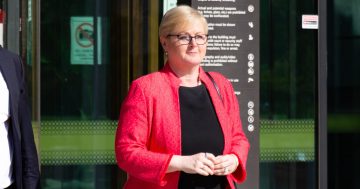
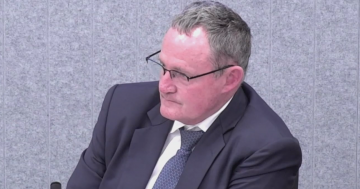
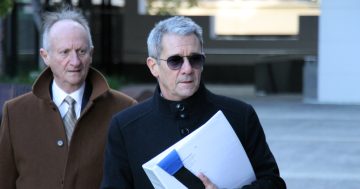
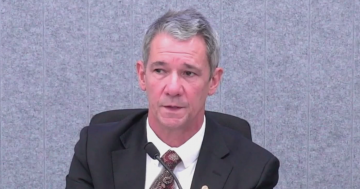

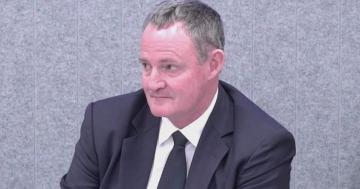
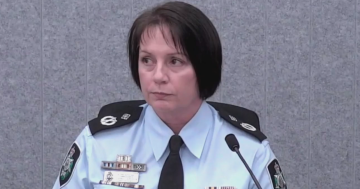
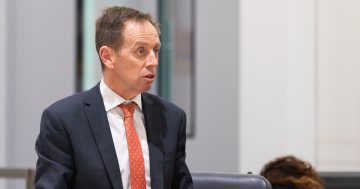

Very pragmatic of Dutton megsy as this is a Labor town as you know and I bet you always vote Labor,… View